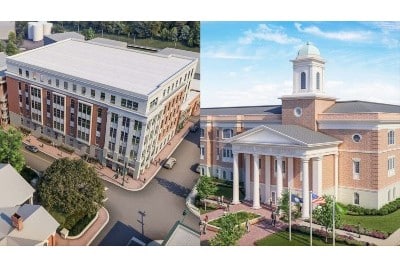
Downtown Staunton or Verona? That is the question which will be posed to voters on Nov. 8: build the new Augusta County courthouse in Verona for more than $80 million or keep it in the Queen City at a cost of nearly $104 million.
“This is kind of a big day in Augusta County. It’s a long time coming,” Augusta County Board of Supervisors Chairman Gerald Garber said at the Augusta County Government Center Wednesday morning during a press conference. “This referendum is not about whether we’re going to have a courthouse. The state Supreme Court has decided that for you. There will be a new courthouse. The question the folks have to decide is where.”
Judge Molesco issued a show cause order on August 9, which has the county under specific deadlines to meet in the process of building a new courthouse. Garber said the state is very involved in the project now.
“If the courts aren’t happy, nobody’s happy,” Garber said. The county does not have a lot of choices about where to build a new courthouse, and work done so far by the county to determine a site was accepted by the state.
Garber said that at least two public forums will be scheduled and announced.
County Administrator Tim Fitzgerald said the project has been six or seven years in the works. On August 12, a judge signed an order for writ of election which places a public referendum about the courthouse on the election ballot in November for Augusta County residents.
Plans for a Verona courthouse, where the Blue Ridge Truck Driving School is now, include three stories of 122,269 square feet for juvenile, general district and circuit courts, as well as offices for magistrate, judges and Commonwealth’s Attorney staff. Secure access will be available for staff and public access for residents.
“It also conforms to what’s always been in the county’s comprehensive plan for the last 30 years is to relocate a court to Verona in this area,” Fitzgerald said.
He added that the estimated price tag of $80,026,447 includes moving costs, site-work utilities, all costs related to building a new courthouse and relocating everyone from downtown Staunton.
“One thing different with this referendum than in 2016, 2016’s cost, you may remember, was $45 million and that was a construction cost only,” Fitzgerald said. The previous price tag did not include all related costs with building a new courthouse in Verona. “And it’s important, because, going forward as the county considers funding and considers the possibility of bonding the project, what goes on the ballot is what we’re allowed to bond.”
The second choice for voters on Nov. 8 is to demolish the existing courthouse at the corner of East Johnson and South Augusta streets in downtown Staunton, and build a five-story building.
“We have to go up in order to get the square footage that we need, that was required of the space needs analysis,” Fitzgerald said of limited space in downtown. The project would also require a waiver for a five-story building, because buildings are not permitted to be more than three stories in downtown.
Building in Staunton would also mean building in a FEMA flood plain. The cost would be $103,855,525 for 110,983 square feet, plus 18,555 square feet of sally port underneath the building.
“We have to demolish that whole existing building there,” Fitzgerald said.
Staff would have to move somewhere else temporarily while the new building is under construction. So staff would have to move twice: out of the old building into temporary facilities, then into the new building.
“We want folks to come out and vote, and let us know,” Fitzgerald said. Either decision will be expensive for voters, so the board of supervisors wants them to decide.
Garber said that renovating the current building in Staunton “would not be acceptable to the state.”
A tax rate increase is inevitable to pay for either choice the voters make.
“I think simple math would tell you we don’t have that kind of money lying around,” Garber said.
When asked about the 1901 courthouse in downtown Staunton, Garber said that he could not publicly disclose who but an organization is interested in repurposing the building.
“We would be delighted if somebody else was in charge of it, had a wonderful use for it, and they were responsible for it,” he said.
An estimated timeline, according to Fitzgerald, if the construction plans and bid take six to eight months in early 2023 and into fall 2023, then construction would take 18 to 24 months for a new courthouse. The county would have approximately a $3 million to $3.5 million a year payment to make on the new courthouse.
Garber expressed support for building in Verona, where more parking would be available and construction would not affect downtown Staunton businesses.
“If you just visualize a major construction project and you try to put it in a small sandbox instead of a big field,” Garber said.
“We’re all committed to getting the facts out there,” Supervisor Pam Carter said. She added that residents should not compare apples and apples when it comes to the cost in Verona. The 2016 cost did not include all costs associated with building a new courthouse.
Supervisor and Vice Chairman Butch Wells said the cost figures are “breathtaking.”
“The can has been kicked down the road and when the judge issued that show cause order there’s no longer a can to kick down the road,” Wells said.
Supervisor Steve Morelli was at the press conference. Augusta County board members Jeff Slaven and Mike Shull were unable to attend the press conference because of work commitments.
“We got to the point where we don’t have another card to play and they played one for us,” Garber said of the state.










